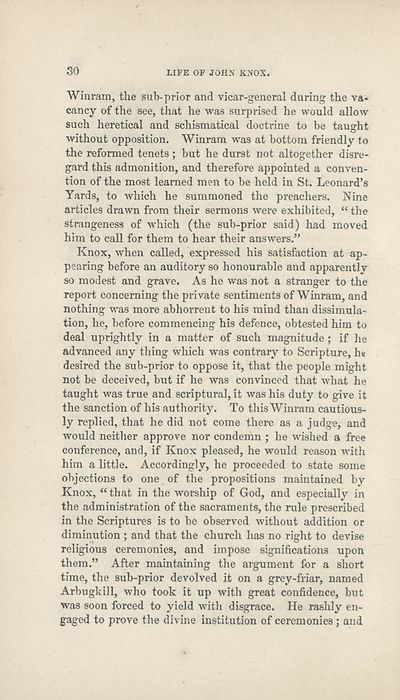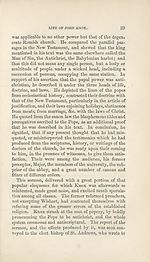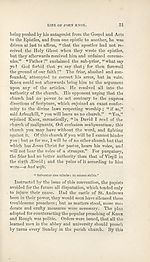Download files
Complete book:
Individual page:
Thumbnail gallery: Grid view | List view

30 LIFE OF JOHN KNOX.
Winram, the sub-prior and vicar-general during the va¬
cancy of the see, that he was surprised he would allow
such heretical and schismatical doctrine to be taught
without opposition. Winram was at bottom friendly to
the reformed tenets ; but he durst not altogether disre¬
gard this admonition, and therefore appointed a conven¬
tion of the most learned men to be held in St. Leonard’s
Yards, to which he summoned the preachers. Nine
articles drawn from their sermons were exhibited, “ the
strangeness of which (the sub-prior said) had moved
him to call for them to hear their answers.”
Knox, when called, expressed his satisfaction at ap¬
pearing before an auditory so honourable and apparently
so modest and grave. As he was not a stranger to the
report concerning the private sentiments of Winram, and
nothing was more abhorrent to his mind than dissimula¬
tion, he, before commencing his defence, obtested him to
deal uprightly in a matter of such magnitude; if lie
advanced any thing which was contrary to Scripture, he
desired the sub-prior to oppose it, that the people might
not be deceived, but if he was convinced that what he
taught was true and scriptural, it was his duty to give it
the sanction of his authority. To this Winram cautious¬
ly replied, that he did not come there as a judge, and
would neither approve nor condemn ; he wished a free
conference, and, if Knox pleased, he would reason with
him a little. Accordingly, he proceeded to state some
objections to one of the propositions maintained by
Knox, “ that in the worship of God, and especially in
the administration of the sacraments, the rule prescribed
in the Scriptures is to be observed without addition or
diminution ; and that the church has no right to devise
religious ceremonies, and impose significations upon
them.” After maintaining the argument for a short
time, the sub-prior devolved it on a grey-friar, named
Arbugkill, who took it up with great confidence, but
was soon forced to yield with disgrace. He rashly en¬
gaged to prove the divine institution of ceremonies ; and
Winram, the sub-prior and vicar-general during the va¬
cancy of the see, that he was surprised he would allow
such heretical and schismatical doctrine to be taught
without opposition. Winram was at bottom friendly to
the reformed tenets ; but he durst not altogether disre¬
gard this admonition, and therefore appointed a conven¬
tion of the most learned men to be held in St. Leonard’s
Yards, to which he summoned the preachers. Nine
articles drawn from their sermons were exhibited, “ the
strangeness of which (the sub-prior said) had moved
him to call for them to hear their answers.”
Knox, when called, expressed his satisfaction at ap¬
pearing before an auditory so honourable and apparently
so modest and grave. As he was not a stranger to the
report concerning the private sentiments of Winram, and
nothing was more abhorrent to his mind than dissimula¬
tion, he, before commencing his defence, obtested him to
deal uprightly in a matter of such magnitude; if lie
advanced any thing which was contrary to Scripture, he
desired the sub-prior to oppose it, that the people might
not be deceived, but if he was convinced that what he
taught was true and scriptural, it was his duty to give it
the sanction of his authority. To this Winram cautious¬
ly replied, that he did not come there as a judge, and
would neither approve nor condemn ; he wished a free
conference, and, if Knox pleased, he would reason with
him a little. Accordingly, he proceeded to state some
objections to one of the propositions maintained by
Knox, “ that in the worship of God, and especially in
the administration of the sacraments, the rule prescribed
in the Scriptures is to be observed without addition or
diminution ; and that the church has no right to devise
religious ceremonies, and impose significations upon
them.” After maintaining the argument for a short
time, the sub-prior devolved it on a grey-friar, named
Arbugkill, who took it up with great confidence, but
was soon forced to yield with disgrace. He rashly en¬
gaged to prove the divine institution of ceremonies ; and
Set display mode to:
![]() Universal Viewer |
Universal Viewer | ![]() Mirador |
Large image | Transcription
Mirador |
Large image | Transcription
| Antiquarian books of Scotland > Scotland/Scots > Life of John Knox ; and, The life of Alexander Henderson > (48) |
|---|
| Permanent URL | https://digital.nls.uk/131832880 |
|---|
| Description | Thousands of printed books from the Antiquarian Books of Scotland collection which dates from 1641 to the 1980s. The collection consists of 14,800 books which were published in Scotland or have a Scottish connection, e.g. through the author, printer or owner. Subjects covered include sport, education, diseases, adventure, occupations, Jacobites, politics and religion. Among the 29 languages represented are English, Gaelic, Italian, French, Russian and Swedish. |
|---|

